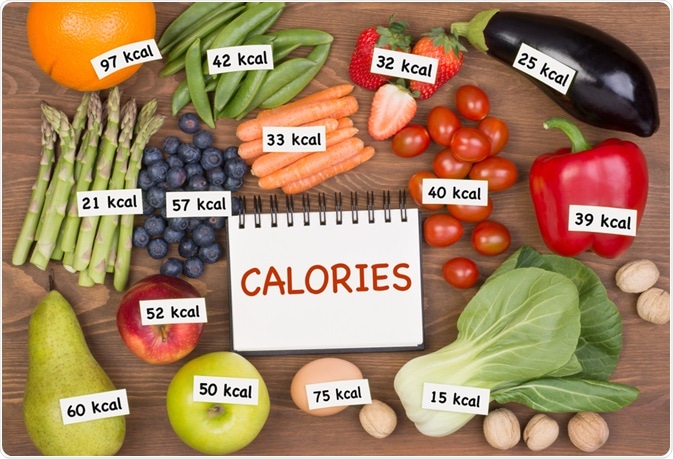The amount of food we consume daily has a significant impact on bodily function. Most adults need a minimum of 2000 calories to sustain metabolism, muscle activity, and brain function. However, too many calories can lead to weight gain and a variety of diseases. This article examines the daily calorie intake based on a person’s sex, age, physical activity and overall health and lifestyle.
 photka | Shutterstock
photka | Shutterstock
The right balance between the different nutrients that compose our daily diets (carbohydrates, fats, proteins, water, vitamins, and minerals) is just as significant as the overall food intake. In simple terms, if we consume more calories than we need on average, we will gain weight and if we consume less than we need on average, we will lose weight in fat, as well as muscle mass.
What is a calorie?
A calorie is a unit of energy. In physical terms, one calorie (“small calorie”, symbol: cal) is defined as the amount of heat energy needed to increase the temperature of one gram of water by one degree Celsius (1°C) at a pressure of one atmosphere (101.325 kPa).
In terms of nutrition and diet, kilocalories (“large calories”, symbol: kcal) are more commonly used to express the amount of energy value of particular foods. In the context of nutrition, the kilojoule (kJ) is the SI unit of food energy.
The total number of calories within a particular food is the sum of the amount of energy released by each of the components (protein, carbohydrates, and fats), minus the fiber content. Fiber is removed as humans are not able to fully digest it.
Basal metabolic rate (BMR)
The basal metabolic rate (BMR) is useful in estimating the required daily energy expenditure of an individual. The BMR is defined as the rate of energy expenditure per unit time at rest. This is the amount of energy that a person needs at any given time to maintain physiological function at rest.
A number of crucial processes are constantly at work in the body and require a constant supply of energy. These include breathing, blood circulation, body temperature maintenance, cell growth, brain and nerve function, as well as muscle contraction. The BMR accounts for around 60-75% of the daily calorie expenditure and declines by around 1-2% for every 10 years after the age of 20.
Several formulas can be used for estimating the basal metabolic rate, one of which is the Mifflin-St. Jeor formula. It suggests the following values for BMR:
- Men: 10 x weight (kg) + 6.25 x height (cm) – 5 x age (y) + 5
- Women: 10 x weight (kg) + 6.25 x height (cm) – 5 x age (y) – 161
Recommended daily caloric intake
The recommended daily intake of calories will vary between individuals, depending on the basal metabolic rate (BMR), which in turn differs with the body mass, height, and age of the person. The amount of food energy required will also depend on the gender and the extent of physical exercise.
Increased mental activity has been linked with moderately increased brain energy consumption since the brain consumes around 20% of the energy used in the human body. In general, older people and those with sedentary lifestyles require fewer calories (or energy-containing foods), while children and physically active people require more.
Recommended daily calorie intakes in the US are around 2500 for men and 2000 for women. However, this will range from around 1000 kcal daily for an infant to as much as 3200 kcal daily for a young male of 16-18 years who leads an active lifestyle. The minimum recommended calorie intake is 1800 for both sexes.
For a child aged 2-3 years, the recommended caloric intake ranges between 1000 kcal and 1400 kcal depending on the amount of daily physical exercise. For adults, the recommended daily calorie intake is generally higher for men compared to women.
It is important to remember that the calories consumed must come from a variety of different nutrients, including proteins, carbohydrates, and fats in order to ensure that the body receives all the nutrients required for its proper function.
Calories and physical exercise
Lifestyle choices have a significant impact upon the number of calories required to maintain a healthy weight. In simple terms, a person’s lifestyle falls into one of three categories depending on the extent of daily physical exercise: sedentary, moderately active or active.
The Harris Benedict Equation is a formula that uses the BMR and then applies an activity factor. For example, the recommended activity factor for a person with a job that requires moderately physical work and who engages in light exercise daily is 1.6. Multiplying the basal metabolic rate (BMR) by the activity factor can aid in calculating the daily energy expenditure, depending not only on the age and sex, but also the daily activity.
Further Reading
Last Updated: Jan 11, 2019